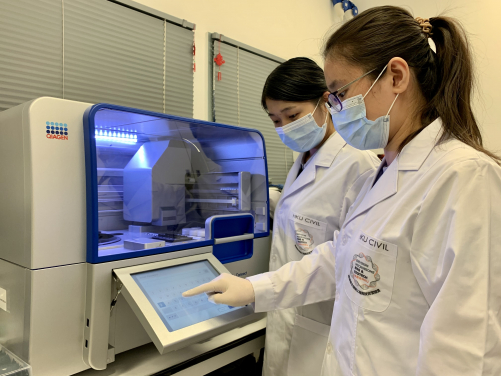In Hong Kong, the sewage monitoring technology developed by the HKU multidisciplinary team led by Professor Tong Zhang of the Department of Civil Engineering has been incorporated as one of the key components of the control strategy for fighting against COVID-19 since December 2020. The sewage test results have provided a basis for statutory public health action in identifying buildings and places for compulsory testing operations to discover infected individuals. The systematic routine sewage monitoring programme of EPD and DSD now covers over 100 regular sampling sites in Hong Kong, providing early warning signals of COVID-19 re-emergence for over five million people.
In light of the emerging highly transmissible SARS-CoV-2 variants worldwide, the team has recently developed an effective and rapid method for identification and quantification of different SARS-CoV-2 variants in sewage using allele-specific RT-qPCR based technology. With primer-probe sets designed by the team and published in the literature, the new method can detect multiple unique and specific mutation sites of different types of variants and identify the type of variants with a high level of accuracy. Compared with genomic sequencing, this method has a much shorter turn-over time (from at least two days reduce to a few hours) and can serve as a rapid screening of different variants for quick follow-up actions.
Recently, the team applied this new method and successfully identified the Delta variant (first identified in Indian) in a sewage sample collected on June 21, 2021 from Tai Po. The sewage test results served to alert the first introduction of the Delta variant in local community sewage one day before the case was being reported on June 23 through the clinical test, and three days before this case was confirmed as the Delta variant carrier by genomic sequencing in the afternoon of June 25.
Professor Zhang said: "EPD and DSD's routine sewage monitoring programme is a powerful radar. SARS-CoV-2 virus signal had been identified in the late evening of June 21 in a sample taken at a regular site in Tai Po at that morning. Our team immediately tested the sample for SARS-CoV-2 variants using the newly developed method, and detected positive signals of L452R and other two mutations of the Delta variant in the afternoon of June 22. "
After checking the data, Professor Zhang reported it to the Government in the late afternoon of June 22 that "HKU's test results about the mutations using Allele-specific RT-qPCR indicated that it is Delta (Indian) variant with a very high probability." The government then issued the Compulsory Testing Notice (due to sewage positive signal) in the afternoon of June 23, followed by the Restriction-Testing Declaration (due to the "preliminary positive" case) in the evening of the same day.







